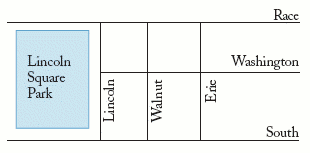Appendix A
Sample assessment task-ICT proficiency
- Holistic assessment of ICT skills and knowledge
- Scenario presented along with a variety of tools (spreadsheet, word processor, etc.)
In this type of assessment, test takers would be evaluated solely on the end product they created (for example, a database, presentation, or document). Component skills would not be isolated and individually assessed. Instead, a scoring scheme would be developed which defined levels of performance and the criteria for reaching each level. This scheme would represent the collective judgments of experts in the field about what adults should know and be able to do in the ICT domain. Below is an example of what one task in a holistic assessment might look like. A complete assessment would include a number of different tasks that vary in difficulty and require a range of ICT knowledge and skills.
Opening scenario (Community context)
You've volunteered to create a flyer for a community clean-up day to be held in your neighborhood. Include the map below along with the following information and create an attractive one-page flyer for the event.
The event will take place on Saturday, May 6th from 1:00 until 4:00. Volunteers are being asked to meet at Lincoln Square Park. Event organizers would like a tear-off registration slip

to be included on the flyer where volunteers can print their name, address and phone number. The registration forms should be dropped off at the community center on Race Street by May 1st.
To complete this task, test takers would need to use a word processing program to create a flyer. The final product would be scored on the accuracy and completeness of the information it contained (e.g., did the flyer include all the relevant information about dates and times, the map and the tear-off registration form?). Additional scoring points might include evaluating the layout and inclusion of graphic elements (borders, lines, etc.).